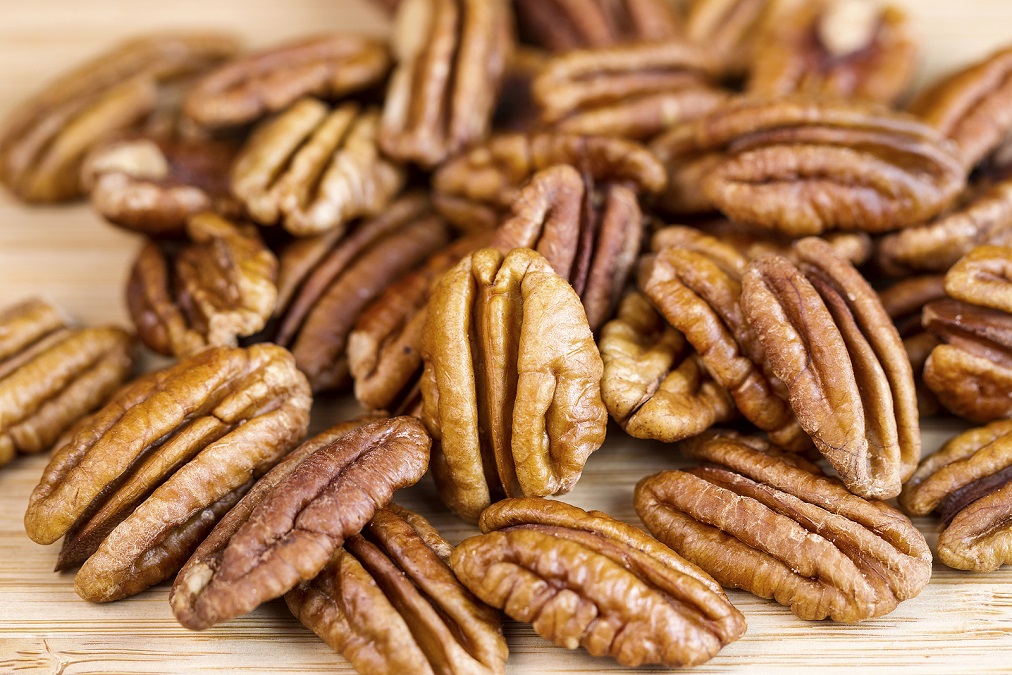 Snacks make up 20% of our daily calorie count.
Snacks make up 20% of our daily calorie count.
And unfortunately, most snacks are not healthy.
Except for one common type of snack, tested in a new study in the American Journal of Clinical Nutrition.
It dropped people’s bad cholesterol by 9.5 mg/dL (that’s a lot).
You can find it in all supermarkets and everyone loves it.
First, scientists at Pennsylvania State University gathered 138 adults who were at higher risk for heart and metabolic diseases.
These participants were overweight or obese and had at least one risk factor for metabolic syndrome.
This is a cluster of conditions that increases the risk for heart disease, stroke, and diabetes.
The participants were randomly assigned to either a pecan snack group or a usual diet group.
The pecan group was asked to eat 57 grams of unsalted, raw pecans daily, replacing their regular snack foods. The control group continued their usual diet.
The study lasted for 12 weeks, and during this period, various health measures were tracked, including cholesterol levels, blood pressure, blood vessel health (measured using flow-mediated dilation and carotid-femoral pulse wave velocity), and diet quality (assessed using the Healthy Eating Index-2020).
Here’s what they discovered:
-
• Pecan eaters saw their total cholesterol drop by 8.1 mg/dL.
• Their “bad” LDL cholesterol decreased by 7.2 mg/dL.
• They enjoyed a 9.5 mg/dL drop in non-HDL cholesterol.
• Their triglycerides (another type of blood fat) fell by 16.4 mg/dL.
• Their overall diet quality score improved by 9.4 points on the Healthy Eating Index.
• The pecan group consumed healthier fats and fiber than the regular diet group.
• People eating pecans reduced their carbohydrate intake by about 6% of total calories.
Interestingly, blood vessel function and blood pressure didn’t change in either group.
These findings suggest that incorporating pecans into your daily routine is a simple and effective way to lower bad cholesterol and boost the healthiness of your diet — both of which are key factors in preventing cardiovascular disease.
But it’s not enough to clear all cholesterol plaque from your arteries.

 Overcoming IBD
Overcoming IBD Multiple Sclerosis
Multiple Sclerosis Banishing Bronchitis
Banishing Bronchitis Gum Disease Gone
Gum Disease Gone Overcoming Onychomycosis
Overcoming Onychomycosis Neuropathy No More
Neuropathy No More The Prostate Protocol
The Prostate Protocol Brain Booster
Brain Booster
 Ironbound
Ironbound
 Solution for Shingles
Solution for Shingles
 The Bone Density Solution
The Bone Density Solution
 The Ultimate Healing Protocol
The Ultimate Healing Protocol
 The Parkinson's Protocol
The Parkinson's Protocol
 The Chronic Kidney Disease Solution
The Chronic Kidney Disease Solution
 Overthrowing Anxiety
Overthrowing Anxiety The Fatty Liver Solution
The Fatty Liver Solution The Hypothyroidism Solution
The Hypothyroidism Solution
 The End of Gout
The End of Gout The Blood Pressure Program
The Blood Pressure Program
 The Oxigized Cholesterol Strategy
The Oxigized Cholesterol Strategy
 Stop Snoring And Sleep Apnea Program
Stop Snoring And Sleep Apnea Program
 The Arthritis Strategy
The Arthritis Strategy The Vertigo & Dizziness Program
The Vertigo & Dizziness Program The 3-Step Diabetes Strategy
The 3-Step Diabetes Strategy Hemorrhoids Healing Protocol
Hemorrhoids Healing Protocol The Erectile Dysfunction Master
The Erectile Dysfunction Master Weight Loss Breeze
Weight Loss Breeze The IBS Program
The IBS Program The Insomnia Program
The Insomnia Program The Migraine and Headache Program
The Migraine and Headache Program The Neck Pain Solution
The Neck Pain Solution The Menopause Solution
The Menopause Solution The Ejaculation Master
The Ejaculation Master The TMJ Solution
The TMJ Solution The Acid Reflux Solution
The Acid Reflux Solution The Fibromyalgia Solution
The Fibromyalgia Solution The Psoriasis Strategy
The Psoriasis Strategy